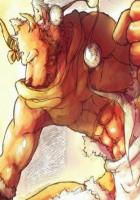THE MYTH of Adonis was localised and his rites celebrated with much solemnity at two places in Western Asia. One of these was Byblus on the coast of Syria, the other was Paphos in Cyprus. Both were great seats of the worship of Aphrodite, or rather of her Semitic counterpart, Astarte; and of both, if we accept the legends, Cinyras, the father of Adonis, was king. Of the two cities Byblus was the more ancient; indeed it claimed to be the oldest city in Phoenicia, and to have been founded in the early ages of the world by the great god El, whom Greeks and Romans identified with Cronus and Saturn respectively. However that may have been, in historical times it ranked as a holy place, the religious capital of the country, the Mecca or Jerusalem of the Phoenicians. The city stood on a height beside the sea, and contained a great sanctuary of Astarte, where in the midst of a spacious open court, surrounded by cloisters and approached from below by staircases, rose a tall cone or obelisk, the holy image of the goddess. In this sanctuary the rites of Adonis were celebrated. Indeed the whole city was sacred to him, and the river Nahr Ibrahim, which falls into the sea a little to the south of Byblus, bore in antiquity the name of Adonis. This was the kingdom of Cinyras. From the earliest to the latest times the city appears to have been ruled by kings, assisted perhaps by a senate or council of elders.
The last king of Byblus bore the ancient name of Cinyras, and was beheaded by Pompey the Great for his tyrannous excesses. His legendary namesake Cinyras is said to have founded a sanctuary of Aphrodite, that is, of Astarte, at a place on Mount Lebanon, distant a day's journey from the capital. The spot was probably Aphaca, at the source of the river Adonis, half-way between Byblus and Baalbec; for at Aphaca there was a famous grove and sanctuary of Astarte which Constantine destroyed on account of the flagitious character of the worship. The site of the temple has been discovered by modern travellers near the miserable village which still bears the name of Afka at the head of the wild, romantic, wooded gorge of the Adonis. The hamlet stands among groves of noble walnut-trees on the brink of the lyn. A little way off the river rushes from a cavern at the foot of a mighty amphitheatre of towering cliffs to plunge in a series of cascades into the awful depths of the glen. The deeper it descends, the ranker and denser grows the vegetation, which, sprouting from the crannies and fissures of the rocks, spreads a green veil over the roaring or murmuring stream in the tremendous chasm below. There is something delicious, almost intoxicating, in the freshness of these tumbling waters, in the sweetness and purity of the mountain air, in the vivid green of the vegetation. The temple, of which some massive hewn blocks and a fine column of Syenite granite still mark the site, occupied a terrace facing the source of the river and commanding a magnificent prospect. Across the foam and the roar of the waterfalls you look up to the cavern and away to the top of the sublime precipices above. So lofty is the cliff that the goats which creep along its ledges to browse on the bushes appear like ants to the spectator hundreds of feet below. Seaward the view is especially impressive when the sun floods the profound gorge with golden light, revealing all the fantastic buttresses and rounded towers of its mountain rampart, and falling softly on the varied green of the woods which clothe its depths. It was here that, according to the legend, Adonis met Aphrodite for the first or the last time, and here his mangled body was buried. A fairer scene could hardly be imagined for a story of tragic love and death. Yet, sequestered as the valley is and must always have been, it is not wholly deserted. A convent or a village may be observed here and there standing out against the sky on the top of some beetling crag, or clinging to the face of a nearly perpendicular cliff high above the foam and the din of the river; and at evening the lights that twinkle through the gloom betray the presence of human habitations on slopes which might seem inaccessible to man. In antiquity the whole of the lovely vale appears to have been dedicated to Adonis, and to this day it is haunted by his memory; for the heights which shut it in are crested at various points by ruined monuments of his worship, some of them overhanging dreadful abysses, down which it turns the head dizzy to look and see the eagles wheeling about their nests far below. One such monument exists at Ghineh. The face of a great rock, above a roughly hewn recess, is here carved with figures of Adonis and Aphrodite. He is portrayed with spear in rest, awaiting the attack of a bear, while she is seated in an attitude of sorrow. Her grief-stricken figure may well be the mourning Aphrodite of the Lebanon described by Macrobius, and the recess in the rock is perhaps her lover's tomb. Every year, in the belief of his worshippers, Adonis was wounded to death on the mountains, and every year the face of nature itself was dyed with his sacred blood. So year by year the Syrian damsels lamented his untimely fate, while the red anemone, his flower, bloomed among the cedars of Lebanon, and the river ran red to the sea, fringing the winding shores of the blue Mediterranean, whenever the wind set inshore, with a sinuous band of crimson.















